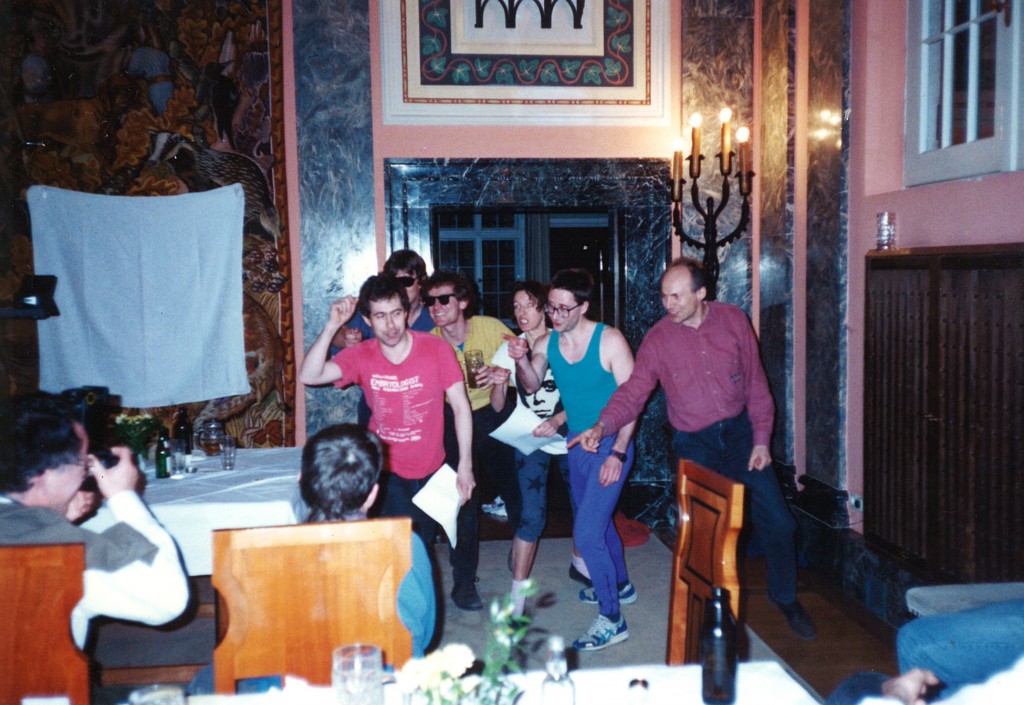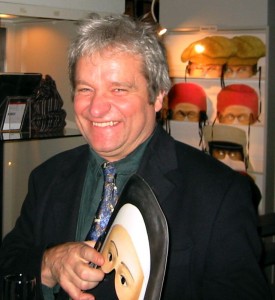Here, just as the summer conference season begins once again, is my infallible guide to Scientific Conference Etiquette.
1. First, pick a good conference. Try not to be too swayed by where it is, although obviously, all other things being equal, if you have a choice of, say, Acapulco or a hotel at Heathrow Terminal 4, it’s OK to be a little biased. What’s a good conference? Depends on what you’re after. Huge congresses are overwhelming, but it’s likely that everyone will be there (although you may not be able to find them). Small meetings are better, but sometimes a bit tedious if the right people don’t come. Note to invited speakers: PLEASE don’t just turn up for your talk and then zoom off to the next venue on your grand tour of the conference circuit. The implication that the people who’ve paid good money to hear your research aren’t worth your hanging around to talk to is extremely irritating, not to say insulting.
2. Dress code: casual. Although check exactly what this means. I once went to a meeting in a chateau in Brittany where casual turned out to be Ralph Lauren, not the charity shop collection of t-shirts and shorts I’d brought for a jolly by the seaside. If you’re a bloke and you feel obliged to pack the standard preppie uniform of chinos, deck shoes, button-down shirt and navy jacket, at least try to balance it with something a little less predictable and boring. Just don’t wear sandals and socks, please. Banquet wear: ranges from blingingly glam to “I am likely to get red wine/beer/food/unmentionable fluids on this outfit so have dressed accordingly”. All are acceptable.
3. Scientific demeanour:
- if a speaker/honcho, be nice to people who want to ask you questions; they may actually be worth listening to (NB Do not chat them up. Not even on the last night). Do not spend all your time talking to your friends and ignoring everyone else. Don’t arrive late and leave early (see above).
- if a peon: if you want to ask questions, do so. If the person you wish to speak to is busy, make an appointment with them for later on, when they’re not telling ribald stories to their mates about the last conference they were at.
- Ask people about their work, and tell them about yours. Don’t worry if you’re feeling outclassed and outgunned by all the brilliant talks – your work is presumably interesting enough for you to be doing it, and deserves to get some exposure. After all, isn’t that the point of conferences?
4. Giving a talk: if it’s your first talk, good luck. I refer you to PhD Comics. Do try not to make too much of a prat of yourself. My first talk was at a herpesvirus meeting in 1984, and was so embarrassingly bad that I could only comfort myself with the thought that I’d never see any of the people there ever again. I wish. I ended up running a lab next to one of them; she only mentioned it every week or so.
5. Listening to talks: if you don’t want to fall asleep, take notes. If you do want to fall asleep, find somewhere you can rest your head and where nobody will notice you dribbling. For situations where you are bored out of your skull and can’t sleep, try playing Reverend Weston’s Alphabet Sermon Game: my Dad the vicar kindly absolved me from actually listening to his sermons by setting me the task of spotting words beginning with successive letters of the alphabet as he was preaching. He used to very obligingly chuck in a Zebedee or Zachariah towards the end. If that doesn’t appeal, I refer you to Conference Bingo.
6. Addendum re talks: Please don’t sit in the front row typing on your sodding laptop. Where were you brought up? It’s RUDE!
7. Bunking off: It’s OK to skip one session if there’s really nothing in it of interest, but that’s your limit. Hangovers, oversleeping, the seductive proximity of the beach/ski slope/shopping mall are not acceptable excuses for missing talks. This does not apply to posters (see below). Be nice to the speakers in the session the morning after the banquet by at least trying to turn up on time.

Scientific Party Animals 2: The Scientific Director of the Ludwig Cancer Research institute (photo courtesy of Ashley Dunn)
8. Posters: I HATE posters with a passion. I have a behavioural defect that makes it impossible for me to read anything serious in the vertical plane without feeling sleepy. My idea of hell is being asked to judge the poster competition. I know I am probably in a minority here, so I salute all of you avid poster enthusiasts. If you’re giving a poster, you’re doomed to hang about next to it, desperately trying to make eye contact with passing punters, and trying not to mind that your next-door neighbour is pulling in the crowds with effortless ease. It’s allegedly helpful to make sure your clothes don’t clash with your poster, so either be prepared for a neon Hawaiian shirt and shorts fashion moment or do your poster in a tasteful range of limited colours. And for heaven’s sake don’t put too many words on it – pictures, pictures, pictures.
9. Mealtimes: Do not attempt to have a conversation with someone you don’t know at breakfast time. Many scientists are not morning people (well, not the ones I know anyway). Lunch and dinner can be quite traumatic if you don’t know anyone. You can sit by yourself and feel sad and lonely, or you can try to break into a group and feel sad and lonely. Or you can discreetly play Candy Crush Saga on your phone (there really is a limit to the number of times you can pretend to read the abstract book). Best approach – find another singleton of about your age and pay grade, and talk to them about work.

Scientific party animals 3. The current Deputy Head of the MRC, the Director of EMBO, and the Director of the USC Broad Center for Stem Cell Research, amongst others, Schloss Ringberg 1992.
10. Socialising: I didn’t have a misspent youth, much to my disgust. I was a swotty child and a swotty undergrad, and by the time I started my PhD, life in the social slow lane seemed a very real prospect. Would I never get to stay up till dawn with unsuitable companions, to attend excitingly louche parties, and get arrested for inappropriate behaviour in a public place? Obviously, with a set up like that, I’m going to tell you that I did all these things (except for the last bit, when we just got let off with a caution), and this is how: dear reader, scientists turn out not to be the sober, white-coated stereotypes of popular culture, but instead are a bunch of mad party animals, and nowhere is this better exemplified than at conferences. Enjoy yourself! Try not to behave so badly that you get noticed though – these people will keep popping up throughout your career and have very long memories. If you get arrested, you could try giving your boss’s name although you may have to pinch their name badge to get this to work really convincingly.
For unpromising social situations, go for the Four Person Ploy (© Melanie Chatfield). Tell yourself that you can leave once you’ve introduced yourself to four people you didn’t know before. For some reason, it takes all the pressure off, and with any luck at least one of them will be halfway interesting.
11. Romance: Really? Are you sure?
12. Returning to the lab: If you have been enthusiastically tweeting/instagramming pics of yourself chilling by the pool or skiing all day, do not expect a very warm welcome from your colleagues, especially your boss. Redeem yourself by giving an interesting and thoughtful account of the conference, gleaned from the notes you have of course already written about the most interesting talks and gossip (scientific gossip, doh). Then pack away your pulling pants and get that nose right back down on the grindstone. You’re never going to get to that meeting in Maui next year otherwise…


Discussion
No comments yet.